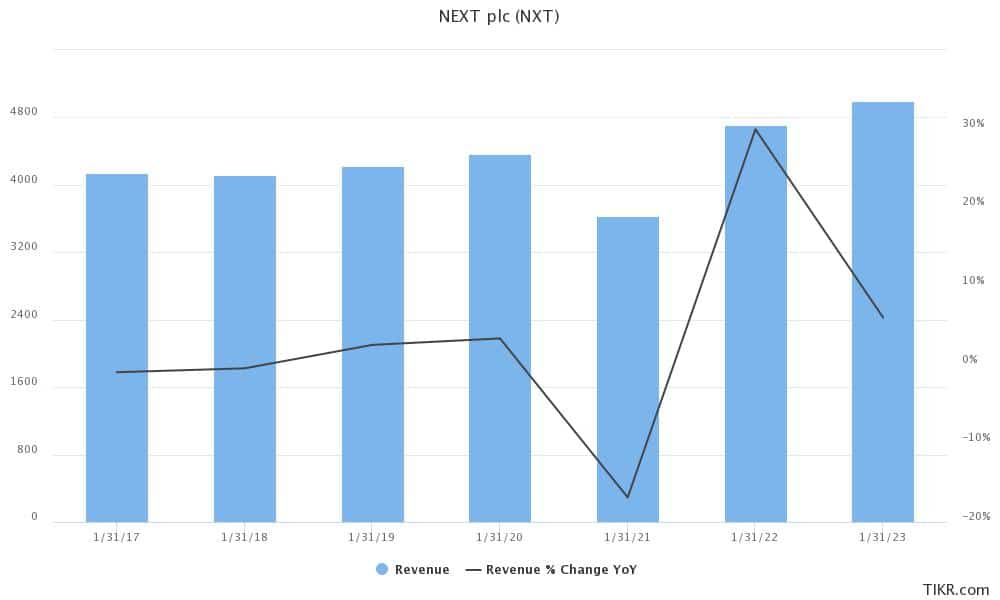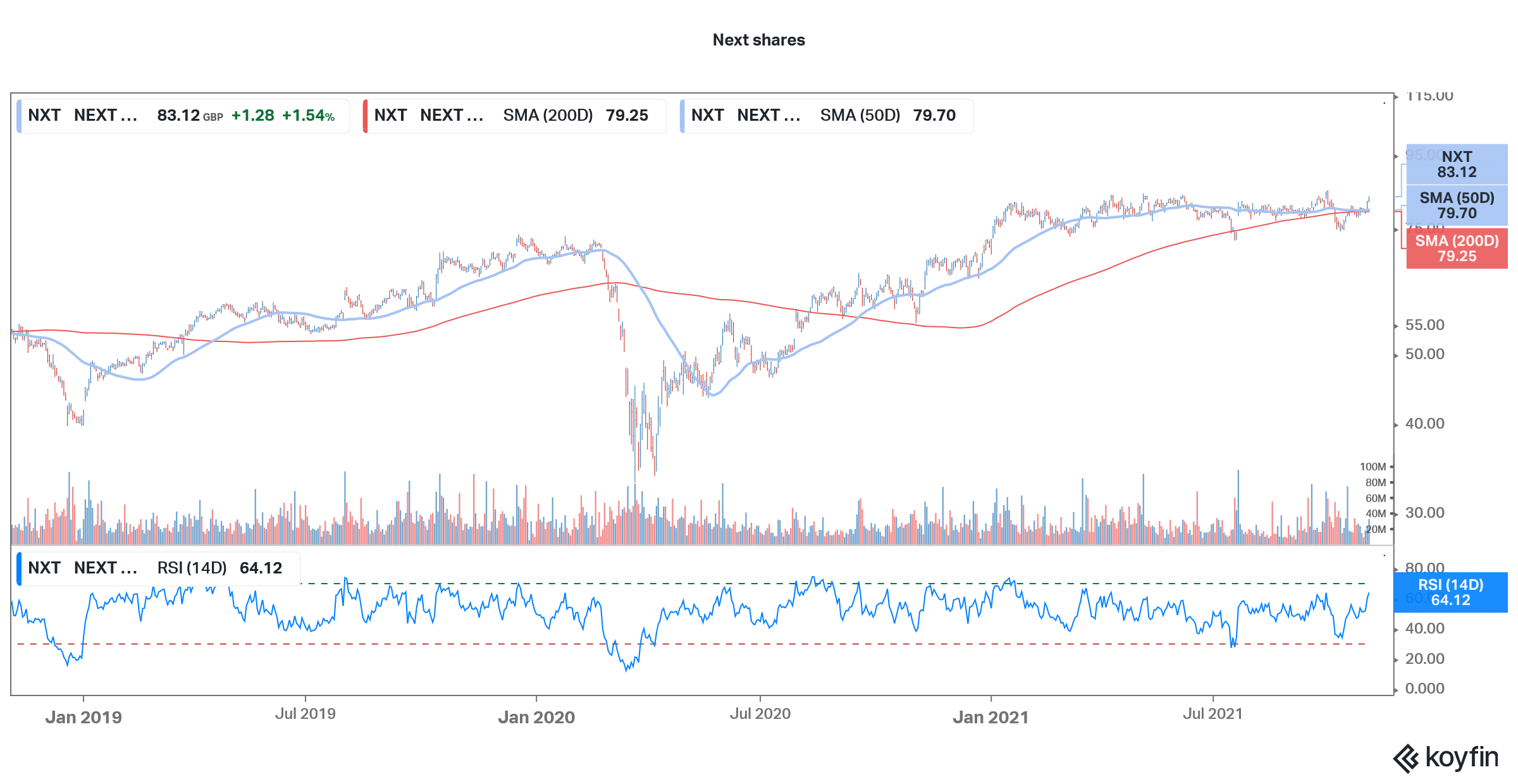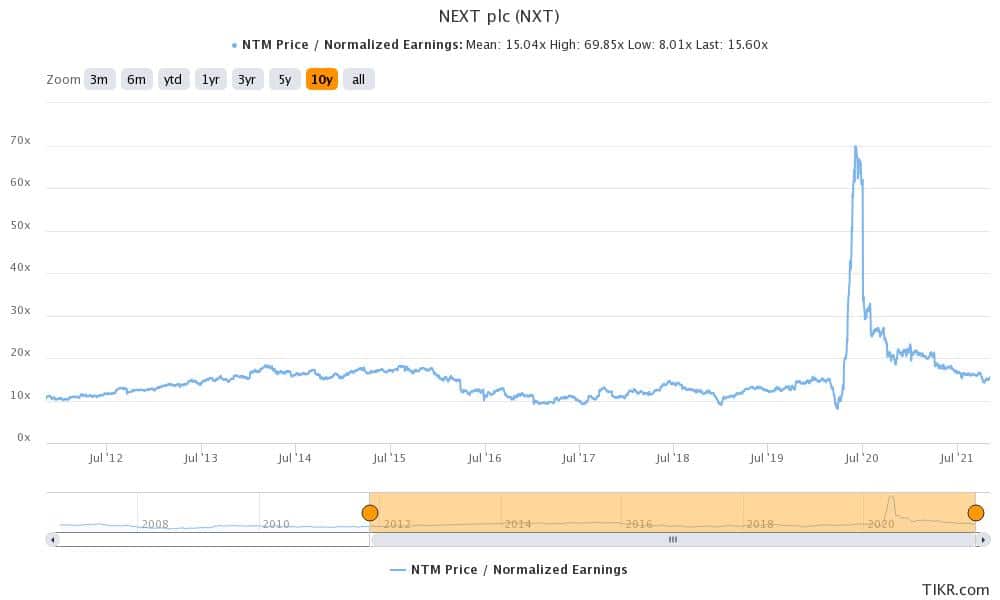Next Plc. Share Price Forecast November 2021 – Time to Buy NXT Shares?
Please note that we are not authorised to provide any investment advice. The content on this page is for information purposes only.
Shares of British multinational retailer Next Plc. (LSE: NXT) were trading lower in early London price action today after the company released its trading update. The shares are however up 40% over the last year.
Next Plc. Shares have come off their 52-week highs. What’s the forecast for the shares and should you buy the dip?
Next Plc trading update

Next said that its full-price sales in the 13-week period ending 30 October increased 17% as compared to the corresponding period in 2019. Here it is worth noting that instead of the usual YoY comparisons, it would be prudent to compare the sales to 2019 considering the 2020 slump caused by the COVID-19 pandemic.
Looking at the revenue breakup, the sales of NEXT branded stocks sold in the UK increased 21% in the fiscal third quarter while the sales of third-party labels in the UK increased by 86%. The overseas online sales increased 41%. Overall, the company’s online sales increased 40%. However, the retail sales at physical stores fell 6.1% in the quarter.
NXT maintains guidance
Next’s topline growth in the fiscal third quarter looks impressive. However, the company cautioned that the growth rates are not sustainable and said that it expects full-price sales to rise 10% in the fourth quarter. The company cited three main reasons for the guidance. Firstly, it believes that the impact from pent up sales would gradually diminish. Secondly, it expects supply chain issues to impact product availability. Finally, it expects the rising inflation, especially of fuel prices, to take a toll on discretionary purchases.
NXT also maintained its full-year profit guidance of £800 million. While the company said that its profits in the last five weeks were ahead of its forecasts but expects them to be offset by higher digital marketing costs and increased use of inbound air freight.
Supply chain issues
To be sure, the supply chain issues are not limited to Next and almost every retailer globally has cautioned about supply chain bottlenecks. From a shortage of supplies to logistics issues, there has been a perfect storm in global supply chains. The situation is expected to worsen ahead of the peak Christmas shopping season and then gradually get better next year. Inflation has also been a major concern with crude oil prices running near multi-year highs. Both these factors could potentially threaten global economic recovery.

Next share price forecast
Analysts have a mixed forecast for Next shares. Of the 20 analysts covering NXT, 11 have a buy rating while eight have a hold rating. One analyst has a sell rating. Its median target price of 8,800p is a premium of 5.9%. The lowest target price of 6,800p is a discount of 18.2% while the highest target price of 10,000p is a premium of 20.3%.
Next share long term forecast
The long-term forecast for Next looks positive as it pivots towards online sales. Notably, while almost all the retailers are investing in online capabilities, Primark is a notable exception and the company continues to focus only on the brick-and-mortar retail operations.
Analysts expect Next’s revenues to rise almost 30% in this fiscal year and surpass the pre-pandemic sales. However, sales growth is expected to fall to a more normalized 6% in the next fiscal year.

NXT share technical analysis
NXT shares look reasonably bullish on the charts and trade above the 50-day and 100-day SMA (simple moving average). The 14-day RSI (relative strength index) is 64.1 which is a neutral indicator. The shares might resume their uptrend after the fall today as the underlying momentum still looks strong in NXT.
Should you buy Next Plc. shares?
Next shares trade at an NTM (next-12 months) PE multiple of 15.6x which is in line with its long-term trading multiples. The valuations look reasonable even as the continued pivot towards e-commerce would help in improving the company’s earnings on a structural basis and also lead to a rerating of the shares.





